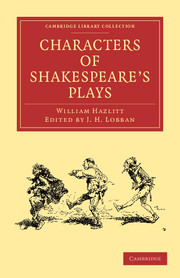Book contents
- Frontmatter
- Preface
- Contents
- Introduction
- Preface
- Cymbeline
- Macbeth
- Julius Cæsar
- Othello
- Timon of Athens
- Coriolanus
- Troilus and Cressida
- Antony and Cleopatra
- Hamlet
- The Tempest
- The Midsummer Night's Dream
- Romeo and Juliet
- Lear
- Richard II
- Henry IV
- Henry V
- Henry VI
- Richard III
- Henry VIII
- King John
- Twelfth Night; or, what you will
- The Two Gentlemen of Verona
- The Merchant of Venice
- The Winter's Tale
- All's Well That Ends Well
- Love's Labour's Lost
- Much Ado About Nothing
- As You Like It
- The Taming of the Shrew
- Measure for Measure
- The Merry Wives of Windsor
- The Comedy of Errors
- Doubtful plays of Shakespear
- Poems and Sonnets
- Notes
Preface
Published online by Cambridge University Press: 07 September 2010
- Frontmatter
- Preface
- Contents
- Introduction
- Preface
- Cymbeline
- Macbeth
- Julius Cæsar
- Othello
- Timon of Athens
- Coriolanus
- Troilus and Cressida
- Antony and Cleopatra
- Hamlet
- The Tempest
- The Midsummer Night's Dream
- Romeo and Juliet
- Lear
- Richard II
- Henry IV
- Henry V
- Henry VI
- Richard III
- Henry VIII
- King John
- Twelfth Night; or, what you will
- The Two Gentlemen of Verona
- The Merchant of Venice
- The Winter's Tale
- All's Well That Ends Well
- Love's Labour's Lost
- Much Ado About Nothing
- As You Like It
- The Taming of the Shrew
- Measure for Measure
- The Merry Wives of Windsor
- The Comedy of Errors
- Doubtful plays of Shakespear
- Poems and Sonnets
- Notes
Summary
It is observed by Mr Pope, that
“If ever any author deserved the name of an original, it was Shakespear. Homer himself drew not his art so immediately from the fountains of nature; it proceeded through Ægyptian strainers and channels, and came to him not without some tincture of the learning, or some cast of the models, of those before him. The poetry of Shakespear was inspiration : indeed, he is not so much an imitator, as an instrument of nature ; and it is not so just to say that he speaks from her, as that she speaks through him.
“His characters are so much nature herself, that it is a sort of injury to call them by so distant a name as copies of her. Those of other poets have a constant resemblance, which shews that they received them from one another, and were but multipliers of the same image : each picture, like a mock-rainbow, is but the reflection of a reflection. But every single character in Shakespear, is as much an individual, as those in life itself; it is as impossible to find any two alike; and such, as from their relation or affinity in any respect appear most to be twins, will, upon comparison, be found remarkably distinct. To this life and variety of character, we must add the wonderful preservation of it; which is such throughout his plays, that had all the speeches been printed without the very names of the persons, I believe one might have applied them with certainty to every speaker.”
- Type
- Chapter
- Information
- Characters of Shakespeare's Plays , pp. 1 - 10Publisher: Cambridge University PressPrint publication year: 2009First published in: 1908

